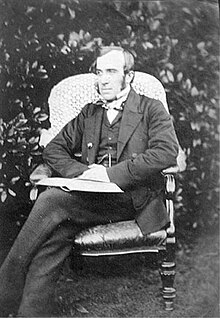Monier-Williams
| Monier Monier-Williams | |
|---|---|

Photo of Monier Monier-Williams by Lewis Carroll
|
|
| Born |
12 November 1819 Bombay, British India |
| Died | 11 April 1899 (aged 79) Cannes, France |
| Alma mater |
King's College School, Balliol College, Oxford; East India Company College; University College, Oxford |
| Known for |
Boden Professor of Sanskrit; Sanskrit–English dictionary |
| Notable awards |
Knight Bachelor; Knight Commander of the Order of the Indian Empire |
Sir Monier Monier-Williams, KCIE (12 November 1819 – 11 April 1899) was the second Boden Professor of Sanskrit at Oxford University, England. He studied, documented and taught Asian languages, especially Sanskrit, Persian and Hindustani.
Monier Williams was born in Bombay, the son of Colonel Monier Williams, surveyor-general in the Bombay presidency. His surname was "Williams" until 1887 when he added his Christian name to his surname to create the hyphenated "Monier-Williams". In 1822 he was sent to England to be educated at private schools at Hove, Chelsea and Finchley. He was educated at King's College School, Balliol College, Oxford (1838–40), the East India Company College (1840–41) and University College, Oxford (1841–44). He married Julia Grantham in 1848. They had six sons and one daughter. He died, aged 79, at Cannes in France.
Monier Williams taught Asian languages, at the East India Company College from 1844 until 1858, when company rule in India ended after the 1857 rebellion. He came to national prominence during the 1860 election campaign for the Boden Chair of Sanskrit at Oxford University, in which he stood against Max Müller.
The vacancy followed the death of Horace Hayman Wilson in 1860. Wilson had started the university's collection of Sanskrit manuscripts upon taking the chair in 1831, and had indicated his preference that Williams should be his successor. The campaign was notoriously acrimonious. Müller was known for his liberal religious views and his philosophical speculations based on his reading of Vedic literature. Monier Williams was seen as a less brilliant scholar, but had a detailed practical knowledge of India itself, and of actual religious practices in modern Hinduism. Müller, in contrast, had never visited India.
...
Wikipedia
